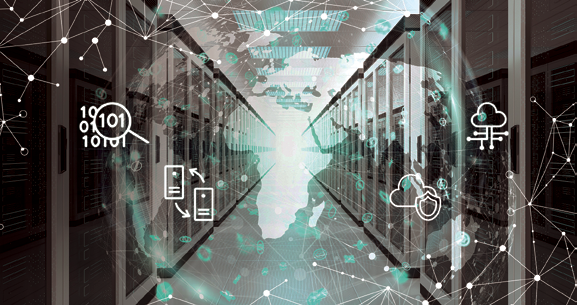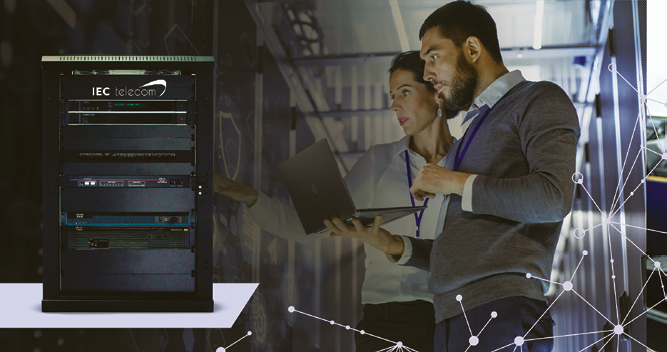The world of business is evolving as the Internet of Things (IoT) transforms global data collection. Satellite communications are at the core of this revolution, as Nabil Ben Soussia, the Group Vice President, Maritime, and Managing Director of IEC Telecom UAE and Kazakhstan explained.
“Analytics will be the next revolution,” he predicted. “We have the potential to be flooded with data from far and wide. What we need to do is decide which pieces of data are important.
He continued, “Today that level of data is a luxury: tomorrow it will be mandatory. As the connectivity of the internet of things becomes commonplace the focus will shift to providing robust and reliable back-up systems. That’s where satellite communications will become crucial.”

Nabil noted that satellites have the unique capability to enable the collection of data from unreachable places. This will be the ‘valuable’ data — the data that comes from hard-to-reach areas where it would be expensive and challenging to send a team of staff to obtain it.
“For anyone wanting to access valuable data from remote and difficult to access areas satellite connectivity is the only real solution since it is reliable and relatively unaffected by the sorts of threats terrestrial communications suffer from such as war, weather and terrain,” he said. “As the data generated becomes core to our ways of working, reliable back-up will become indispensable and satcom is the best method to back-up this data,” he said.

IEC Telecom is working with partner companies to develop IOT devices with data plans that suit a variety of business needs.
Mr. Ben Soussia predicted that today the greatest demand is for higher and higher speeds of connectivity; however, with IoT, it is not the speed that is the deciding criteria, rather, it is the reliability and integrity. That is a 180 degree change. Machines are more efficient and transferring data between machines will become the norm as reliance on IoT Things and every-day connectivity becomes standard practice.
He commented, “We are developing adaptive, cost-effective hardware with smaller packages of airtime which will enable the transfer of vast amounts of data at lower speeds but with enhanced security and reliable back-up systems – this is what we believe will be the requirements of this aspects of business connectivity over future years.”
Soussia advised that the roll-out of 5G will generate greater amounts of data traffic around the world. “With 5G it will be possible to send large amounts of data. Today there are millions of connected terminals but tomorrow it will be billions! 5G can accommodate this additional data and satellites can provide the reliable back-up systems to ensure this communication is secure, protected and backed-up.”
The company’s Managing Director further stated that all sectors of business are heading in this direction, and that includes manufacturing, construction, maritime, and the oil and gas industry. The advance in affordable satellite communications, such as using smallsats, will enable increasing numbers of businesses to access data connectivity and IoT.

“However, it is not enough to collect the data — you need the ability to analyze it,” he advised. “We foresee that Business Analytics will become central to every business in the future.”
This data-driven transformation in the manner in which all do business will accelerate when standardization takes place.
“Standardization of software, sensors and other operating systems will enable the majority of the technology around the globe to function using the same platforms — hence, it is the catalyst that will kick-start the rapid spread of IOT data connectivity throughout the world,” Soussia explained. “The data gathered can then be processed and compared across industries. Systems will be able to talk to one another and procedures can be streamlined and harmonized.

A closing forecast from Soussia revealed his forecast that this is when the IOT revolution will really take off. The technology will develop at a quicker pace and, with industry wide use, the economies of scale will make this level of connectivity more affordable.

The interviewee, Nabil Ben Soussia, is the Managing Director – IEC Telecom Middle East and Kazakhstan Vice President – Maritime, IEC Telecom Group
A high-performance leader with extensive experience in the MENA region, he joined IEC Telecom Group as Director of Technologies and Operations in 2008. In the capacity of Business Unit Director, Nabil played a key role in the opening of the Abu Dhabi office in 2011. In 2014, Nabil initiated the opening of a new office in Kazakhstan, and in the same year, he became Managing Director of the Middle East division. In 2018, Nabil moved into the role of Group Vice President, and is responsible for the strategic vision and management of the maritime segment.
During his tenure, Nabil has been instrumental in earning international recognition for IEC Telecom, including Thuraya Best Performing SP Maritime (2014, 2018), YahClick Service Partner of the Year (2014), YahClick Innovation Excellence Award (2018), and many more.

